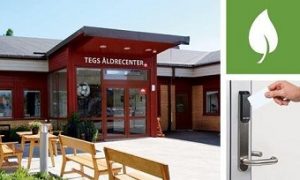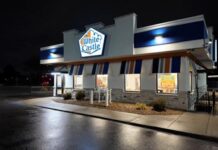
Planning elderly care involves thinking about the long term. Building and managing residential homes with a sustainability ethos is increasingly important — to local governments and private providers. Security technology decisions can have an impact on whether they succeed.
Tegs Äldrecenter in Umeå, Sweden, chose an access control solution from Tidomat including around 100 Assa Abloy Aperio locks wirelessly integrated with the system. Aperio locks are battery powered and operate without any connection to mains electricity. As well as enabling centre residents to move around in safety and convenience, Aperio helps the care facility reduce its daily energy consumption.
“With Aperio we offer our customers energy savings and extended access control in one,” says Lennart Eriksson, Tidomat’s CEO. The World Green Building Council identifies energy efficiency as an essential feature in any “green building”*. The appetite for investing in this and other sustainability-friendly improvements is growing. In one recent access control report Assa Abloy says that “findings suggest sustainability is now a major consideration when it comes to procurement.”
A survey for recent Euromonitor publication “Rethinking Sustainability” identifies the focal points for these investments over the coming five years. Both “energy” and “sustainable sourcing” are high on the priority list. Also, according to Assa Abloy, a recent benchmarking study estimates that choosing wireless over wired locking can reduce operating energy consumption, and therefore costs, by around 70%.
“Battery-powered electronic locks with inbuilt RFID readers are a cost-effective way to upgrade existing access control and bring it to more doors,” says Lars Angelin, Business Development Manager for Wireless Locks at Assa Abloy Opening Solutions EMEA. “Our Aperio wire-free locks are much more cost-effective to install and run than traditional electronic door security.”
Tegs’ energy-efficient Aperio installation is flexible and future-proofed. Because Aperio locks are modular and scalable on demand, Umeå Social Services can bring more facilities into the same access management system whenever required at a later date. Wireless locks typically enjoy a longer lifetime, too: they can usually be moved if building spaces are reconfigured or doors are repositioned — unlike wired locks which are installed and cabled invasively. Maintenance requirements for wire-free locks are minimal: all they need is a new standard battery every 2 years or so.











